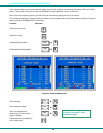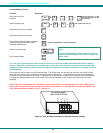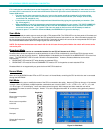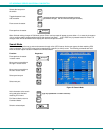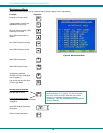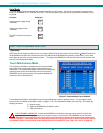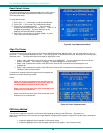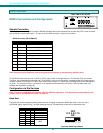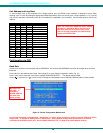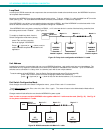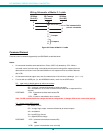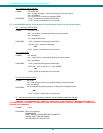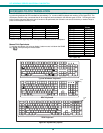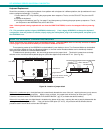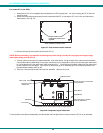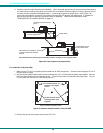
NTI NODEMUX SERIES UNIVERSAL KVM SWITCH
28
Unit Address and Loop Back
To allow multiple units to be controlled from a single terminal port, the RS232 control interface is designed to allow "daisy
chaining" up to 15 units. By setting the appropriate RS232 dip switches, each unit can be given a unique address (1-15). Then the
unit will only respond to commands on the bus if its address is embedded in the command. Use the table below to set the unit
address.
DIP SWITCH UNIT ADDRESS
8 7 6 5
OFF OFF OFF OFF 0 (not valid)
OFF OFF OFF ON 1
OFF OFF ON OFF 2
OFF OFF ON ON 3
OFF ON OFF OFF 4
OFF ON OFF ON 5
OFF ON ON OFF 6
OFF ON ON ON 7
ON OFF OFF OFF 8
ON OFF OFF ON 9
ON OFF ON OFF 10
ON OFF ON ON 11
ON ON OFF OFF 12
ON ON OFF ON 13
ON ON ON OFF 14
ON ON ON ON 15
Configuration via OSD
Baud Rate
In order for a terminal to communicate with the NODEMUX, the terminal and NODEMUX must each be configured for the same
baud rate.
Press <W> from the Administration Mode menu (page 15) to enter Switch Configuration mode. (Fig. 31)
Press <Tab> once to move the cursor bar to highlight "RS232 BAUD RATE". The default setting is 9600.
Press < > (up arrow) or < > (down arrow) to change the selected baud rate to 300,600,1200,2400,4800, or back to 9600.
Figure 31- Switch Configuration Mode screen
In the event the setting is changed from "stand alone" to "slave", when the switch is power cycled the OSD menu will no
longer work. To restore the setting back to "stand alone", factory default settings must be restored via a terminal
connected to the RS232 control port. See the RS232 Command "CF" on page 30 to restore default settings.
Be careful with
this field. If
changed to
SLAVE, OSD will
not work after
power cycling.
Note: The "loop back" RS232 dip switch (RS232
dip switch 1) should be ON for the last unit in
the chain, and OFF for all other units. If only
one unit is being controlled, the loop back dip
switch should be left ON.



